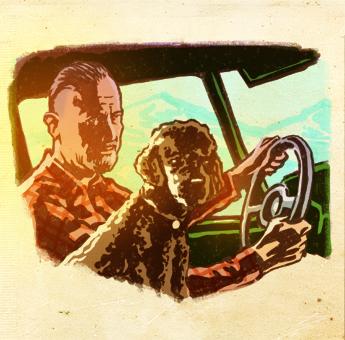Excerpts from Travels with Charley
John Steinbeck

The next passage in my journey is a love affair. I am in love with Montana. For other states I have admiration, respect, recognition, even some affection, but with Montana it is love, and it’s difficult to analyze love when you’re in it. Once, when I raptured in a violet glow given off by the Queen of the World, my father asked me why, and I thought he was crazy not to see. Of course I know now she was a mouse-haired, freckle-nosed, scabby-kneed little girl with a voice like a bat and the loving kindness of a gila monster, but then she lighted up the landscape and me. It seems to me that Montana is a great splash of grandeur. The scale is huge but not overpowering. The land is rich with grass and color, and the mountains are the kind I would create if mountains were ever put on my agenda. Montana seems to me to be what a small boy would think Texas is like from hearing Texans. Here for the first time I heard a definite regional accent unaffected by TV-ese, a slow-paced warm speech. It seemed to me that the frantic bustle of America was not in Montana. Its people did not seem afraid of shadows in a John Birch Society sense. The calm of the mountains and the rolling grasslands had got into the inhabitants. It was hunting season when I drove through the state. The men I talked to seemed to me not moved to a riot of seasonal slaughter but simply to be going out to kill edible meat. Again my attitude may be informed by love, but it seemed to me that the towns were places to live in rather than nervous hives. People had time to pause in their occupations to undertake the passing art of neighborliness.
I found I did not rush through the towns to get them over with. I even found things I had to buy to make myself linger. In Billings I bought a hat, in Livingston a jacket, in Butte a rifle I didn’t particularly need, a Remington bolt-action .22, secondhand but in beautiful condition. Then I found a telescope sight I had to have, and waited while it was mounted on the rifle, and in the process got to know everyone in the shop and any customers who entered. With the gun in a vise and the bolt out, we zeroed the new sight on a chimney three blocks away, and later when I got to shooting the little gun I found no reason to change it. I spent a good part of a morning at this, mostly because I wanted to stay. But I see that, as usual, love is inarticulate. Montana has a spell on me. It is grandeur and warmth. If Montana had a seacoast, or if I could live away from the sea, I would instantly move there and petition for admission. Of all the states it is my favorite and my love.
At Custer we made a side trip south to pay our respects to General Custer and Sitting Bull on the battlefield of Little Big Horn. I don’t suppose there is an American who doesn’t carry Remington’s painting of the last defense of the center column of the 7th Cavalry in his head. I removed my hat in memory of brave men, and Charley saluted in his own manner but I thought with great respect.
The whole of eastern Montana and the western Dakotas is memory-marked as Injun country, and the memories are not very old either. Some years ago my neighbor was Charles Erskine Scott Wood, who wrote Heavenly Discourse. He was a very old man when I knew him, but as a young lieutenant just out of military academy he had been assigned to General Miles and he served in the Chief Joseph campaign. His memory of it was very clear and very sad. He said it was one of the most gallant retreats in all history. Chief Joseph and the Nez Percés with squaws and children, dogs, and all their possessions, retreated under heavy fire for over a thousand miles, trying to escape to Canada. Wood said they fought every step of the way against odds until finally they were surrounded by the cavalry under General Miles and the large part of them wiped out. It was the saddest duty he had ever performed, Wood said, and he had never lost his respect for the fighting qualities of the Nez Percés. “If they hadn’t had their families with them we could never have caught them,” he said. “And if we had been evenly matched in men and weapons, we couldn’t have beaten them. They were men,” he said, “Real men.”
John Steinbeck’s Grapes of Wrath, which had been published in 1939, won the Nobel Prize for Literature in 1962. Just prior in 1960, a depressed and ailing Steinbeck decided he was out of touch with America and took his French poodle on a drive cross-country in a pickup truck. The resulting book became one of readers’ favorites and is reprinted by arrangement with Penguin Books, a member of Penguin Group (USA) Inc., from Travels with Charlie, In Search of America, by John Steinbeck. Copyright © 1962 by John Steinbeck; renewed 1990 by Elaine Steinbeck, Thom Steinbeck, and John Steinbeck IV.
Confident and robust, Jubilee Hitchhiker is a comprehensive biography of late novelist and poet Richard Brautigan, author of Troutfishing in America and A Confederate General from Big Sur, among many others. Brautigan was shrouded in enigma, erratic and unpredictable in his habits and presentation. But his career was formidable, an inspiration to young writers like William Hjortsberg trying to get their start. Hjortsberg is now the author of nine books and four completed films.
Leave a Comment Here
Leave a Comment Here